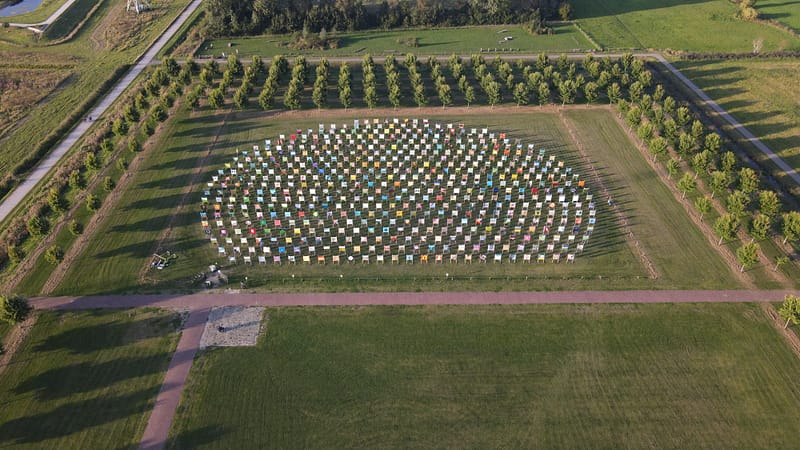Noch zwei Wochen Colorfield Performance 2021.
Ende Juni habe ich in Elst, Niederlande, an der Colorfield Performance 2021 teilgenommen. Von Mitte April bis Ende August haben über 500 Künstler aus über 20 Ländern Holzpaneel bemalt, die nun noch bis 3. Oktober 2021 zu besichtigen sind. Nun ist also das phänomenale Land-Art-Projekt fertig.
So sieht es aus der Luft aus:

Übersetzung des Einleitungstextes von der Colorfield Performance Webseite:
Park Lingezegen – Elst
Landschaftspark zwischen Arnheim und NijmegenDie Colorfield Performance wird mehr und mehr zu einem Begriff in der bildenden Kunst. Es handelt sich um ein großes Land-Art-Projekt, bei dem der Monumentaldesigner und Künstler Dirk Hakze mit anderen Künstlern zusammenarbeitet. Die Idee dahinter ist, dass aus einem gemeinsamen Konzept die einzelnen Beiträge zu einer großen bunten Einheit zusammenfließen. So lassen sich große Kunstwerke schaffen, die in der Landschaft eine kraftvolle Wirkung entfalten.
Adresse: Park Lingezegen – Elst, Niederlande
Anreise (in Niederländisch): https://parklingezegen.nl/routebeschrijving-bereikbaarheid-the-colorfield-performance/
Mein Colorfield Performance 2021 Bild
Mein Einsatztag war der 24. Juni 2021. Das war alles mit relativ viel Aufwand verbunden. Meine Anreise mit dem Auto dauerte auf dem Hin und Rückweg jeweils 2 Tage. Für den Aufenthalt selber hatte ich 3 Tage geplant und das war gut so.
Die besondere Herausforderung war ja, das Bild innerhalb eines Tages fertig zu malen. Das hatte ich schon länger nicht gemacht. Auch habe ich schon länger keine Acrylfarbe verwendet. Darum habe ich mir davor eine Woche Zeit zur Vorbereitung genommen, indem ich mehrere Bilder in Acryl und soweit als möglich in einem Tag fertig malte. Auch die Größe und der Untergrund waren eine ziemliche Herausforderung. Es handelt sich um Holzpaneele in der Größe 122 x 122 cm. Sie waren zwar mit Gesso vorgrundiert. Trotzdem war es ein sehr ungewohntes Gefühl und ich brauchte länger bis genügend Farbe auf dem Untergrund haften blielt.
Als Motiv habe ich die Skyline vom Wolfgangsee gewählt. Es handelt sich dabei um den Blick aus Strobl Richtung Sankt Gilgen. In gewisser Weise etwas Werbung für das Salzkammergut und den Wolfgangsee. Im Gegensatz zu den Bildern meiner derzeitigen Serie habe ich dieses Bild in Acryl Spachteltechnik gemalt. Und so sah das Ergebnis aus:

Ausstellungsdauer und Sonderpreis
Nun kann man das Projekt noch bis Anfang Oktober in den Niederlanden besuchen. Das sind also noch zwei Wochen Gelegenheit die Colorfield Performance in seiner Gesamtheit zu besichtigen und Bilder zu kaufen. Der Veranstalter Dirk Hakze ist bevollmächtigt mein Bild zu einem Sonderpreis von 1200 Euro zu verkaufen. In Anbetracht des hohen Aufwands ist das ein sehr niedriger Preis, den ich nur bis 3. Oktober 2021 anbieten kann.

